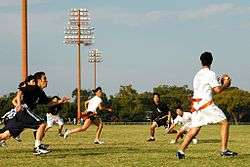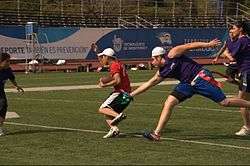Flag football
Flag football is a version of American football where the basic rules of the game are similar to those of the mainstream game (often called "tackle football" for contrast), but instead of tackling players to the ground, the defensive team must remove a flag or flag belt from the ball carrier ("deflagging") to end a down, and contact is not permitted between players; it will result in a penalty for the team that initiates it.
 A co-ed game of flag football being played at University of Texas. | |
| Characteristics | |
|---|---|
| Contact | None |
| Team members | 2 teams of 4-11 |
| Mixed gender | Yes |
| Type | Outdoor, indoor, team sport, ball game |
| Equipment | Ball, flag |
| Venue | football field |
| Presence | |
| Country or region | Worldwide |
| Olympic | No |
| Paralympic | No |
Variations
Chiefly because there is no dominant sanctioning organization for the sport, the game has mutated into many variations: 9, 8, 7, 6, 5, and 4 players on each side; coed or single-gender; without kicking and punting and with point-after conversions (including some with 1, 2, and 3 point tries) or without; and field sizes that vary from full Canadian Football League (CFL) size, National Football League (NFL) size (120 yards long by 531⁄3 yards wide), to fields a third that size.
An important distinction is whether linemen are allowed to catch passes ("Eligible Linemen") or, as in the NFL / CFL, are not allowed to do so ("Ineligible Linemen"). Flag (and touch) football may also be divided into "contact" or "non-contact", depending on whether or not blocking is allowed; if allowed, blocking is usually restricted to the chest.[1]
The ability or inability for the quarterback to advance the ball past the line of scrimmage (LOS) by running is another rule subject to variation by league.
Competition

The sport has a strong amateur following and several national and international competitions each year sponsored by various associations.
North America
On June 28, 2017, the inaugural game for the newly formed American Flag Football League was played. [2] The league plans to launch eight league-owned teams for 2018.[3]
In May 2020, the National Association of Intercollegiate Athletics (NAIA), in partnership with the NFL, announced the addition of flag football as a varsity sport for female student-athletes.[4] The NAIA became the first collegiate governing body to sanction the sport at the varsity level. Women's flag will begin during the 2020—21 season as an emerging sport with at least 15 teams, the NAIA and NFL also expect upgrade the sport to an invitational level sport by 2022 with at least 25 teams.[5]
International
The International Woman's Flag Football Association, otherwise known as the IWFFA, hosts 8 on 8 flag football tournaments and flag football trainings across the world with participants from the United States, Canada, Mexico, Sweden, Norway, Finland, Denmark, Iceland, Scotland and several other nations. The organization is the largest organization for women and girls in the sport of flag football. The most active tournament is held each February in Key West, Florida, called the Kelly McGillis Classic where over 90 women and girls teams participate in 8 on 8, semi - blocking contact flag football. There are no restrictions to for girls and women to play.
The International Flag Football Festival (IFFF) organizes the World Cup of Flag Football featuring teams from the United States, Mexico and several other nations.
The International Federation of American Football (IFAF) organizes the IFAF Flag Football World Championship every two years since 2002.
Europe
Flag football competition in the United Kingdom is 5-a-side and organized by the BAFA National Leagues. At a senior level as of 2011, it is played by fifteen teams divided into two regional conferences, North (Scotland), and South (England & Wales) with the top teams qualifying for playoffs at the end of the season. The league also organizes teams competing at youth and cadet levels.[6][7] Flag matches in the UK are played with five players on each side with no contact, and are officiated according to the IFAF flag football rules with a few minor variations.[8]
Basic rules
The specific rules of flag football vary widely by league, though all share in common their replication of the rules of traditional US-American football with tackling replaced by flag-pulling. Traditional American football rules are often omitted, changed or simplified to reflect the more recreational nature of the game, desire to avoid physical contact and injury, and the generally smaller number of participating players per side.
References
| Wikimedia Commons has media related to Flag football. |
USFTL.com United States Flag & Touch Football League
- "Flag Football Plays - Lineman and Blocking". Best Flag Football Plays. Retrieved 2016-01-01.
- Taylor, Tom (June 29, 2017). "Star-studded flag football league leans on NFL influences in debut". Sports Illustrated. Retrieved July 22, 2017.
- Rovell, Darren (May 18, 2017). "Michael Vick to play in trial game for American Flag Football League". ESPN. Retrieved July 22, 2017.
- AP Staff (4 May 2020). "NAIA to sponsor women's flag football with NFL partnership". ESPN. Retrieved 5 May 2020.
- Kerkhoff, Blair (4 May 2020). "With NFL's backing, women's college flag football will debut at NAIA schools in 2021". The Kansas City Star. Retrieved 5 May 2020.
- "BAFACL Flag South". BAFA Community Leagues. Archived from the original on 24 July 2012. Retrieved 5 May 2011.
- "BAFACL Flag North". BAFA Community Leagues. Archived from the original on 19 July 2012. Retrieved 5 May 2011.
- "BAFA Rules Committee - Flag football". British American Football Referees' Association. Archived from the original on 22 July 2012. Retrieved 17 September 2010.